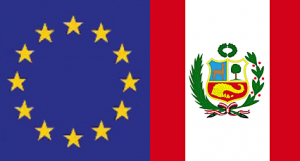 On March 1, the trade agreement negotiated among the European Union, Peru, and Colombia went into effect in the EU and Peru. The EC press office reports that Colombia is still in the process of ratifying the agreement, and is expected to complete ratification this year. The full text of the trade agreement is here – and the intellectual property provisions are found in Articles 202 through 257.
On March 1, the trade agreement negotiated among the European Union, Peru, and Colombia went into effect in the EU and Peru. The EC press office reports that Colombia is still in the process of ratifying the agreement, and is expected to complete ratification this year. The full text of the trade agreement is here – and the intellectual property provisions are found in Articles 202 through 257.
Like other free trade agreements, it contains a requirement of data exclusivity; a TRIPS-Plus provision that several studies have shown lead to higher prices for pharmaceuticals (for evidence, see page 190 of the new WTO/WHO/WIPO report on the intersections between public health, IP, and trade). Article 231 requires a five year period of data exclusivity for pharmaceutical products containing new chemical entities. However, Article 231(4)(a) grants a public interest exception for data exclusivity:
Parties may regulate exceptions for reasons of public interest, situations of national emergency or extreme urgency, when it is necessary to allow access to those data to third parties; [emphasis added]
This flexibility does not exist in the US-Peru Free Trade Agreement. It is not found in the unpopular U.S. proposal for intellectual property in the TPP leaked in 2011. However, the U.S. is reported to be searching for ways forward in the deadlocked negotiations over IP and health, so this type of flexibility might be something that could be considered.
However, the U.S. would do even better to consider other alternatives to test data protection that have been proposed by academics and advocates for access to medicines. Carlos Correa has argued for a misappropriation approach to the protection of test data – where a country would prevent “the use of information acquired through dishonest practices (e.g. espionage, breach of confidence), as background for an independent submission for marketing approval.” Robert Weissman has proposed automatic compulsory licensing systems for registration data in certain circumstances. These circumstances could be broad (for instance, when price is acting as a barrier to access) or more narrow, (for instance, when a medicine is not covered by a patent or where a compulsory license has been issued for the patents protecting the medicine). James Love and Judit Rius Sanjuan have called for a cost-sharing approach that gives generic competitors an automatic right to use originators’ data upon payment of fair compensation to the originators. This approach is used in the United States for agricultural chemicals, and it has been incorporated into trade agreements that the European Free Trade Association (Liechtenstein, Iceland, Norway and Switzerland) has signed with Korea and Lebanon.




